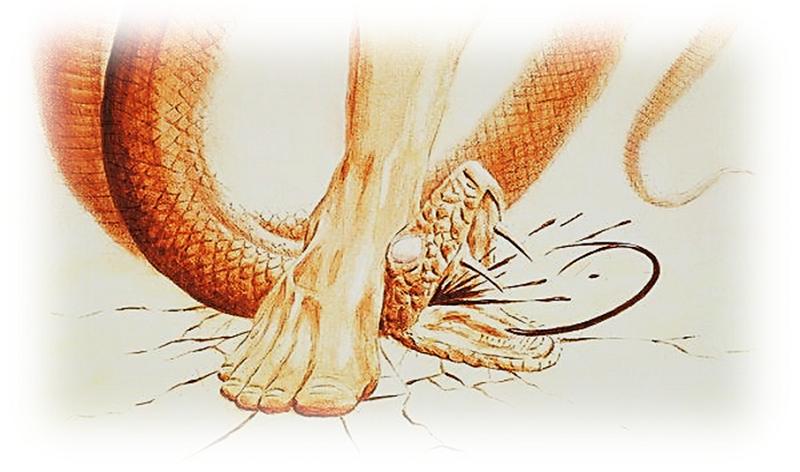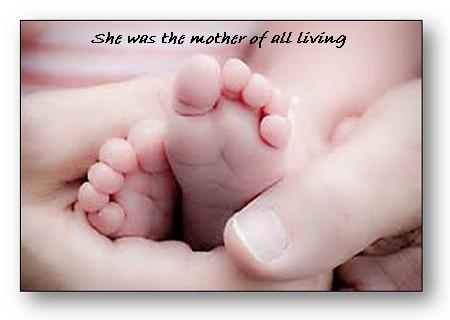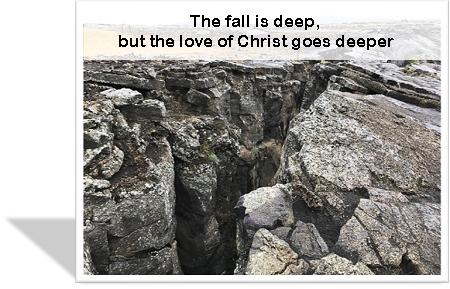Genesis 3 - The Triumph of Divine Grace
Genesis 3 - The Triumph of Divine Grace
Read Genesis 3

From what we have seen, it may appear that Satan has won a major victory. Though the devil himself fell under God’s condemnation, he succeeded in severely damaging God’s prize possession, the living image-bearers of God. However, here in the very shadow of the fall God reveals that He will triumph gloriously over Satan by redeeming mankind. And wondrously, Adam receives this promise by faith and testifies of his hope in the Lord.
1. The Promise of Redemption⤒🔗
The Lord God said to the serpent in Genesis 3:15,
And I will put enmity between thee and the woman, and between thy seed and her seed; it shall bruise thy head, and thou shalt bruise his heel.
Satan had tempted the woman to turn away from God, and she chose to become an enemy of the Lord. But the Lord reverses the situation: “I will put enmity between thee and the woman.” By His sovereign, heart-changing grace, God turns the woman against the devil, which means that she will again follow the Lord. Praise God for the power of His converting grace!
God declares a spiritual war between two seeds. “Seed” means offspring or children. As Genesis 4 makes clear, some of mankind will continue to live as the seed of the serpent, following Satan as their spiritual father and head. John calls them “the children of the devil” and uses Cain as an example of them and their evil ways (1 John 3:10, 12). But God will give the woman another “seed” who, like Abel and Seth, fear the Lord and call upon His name by faith (Gen. 4:25-26; Heb. 11:4). They are her true spiritual descendants (cf. Rom. 4:11-12). Spiritual combat between the devil and the children of the world on one side, and the righteous children of God on the other, has ensued throughout this age.
God tells the serpent that the woman’s seed “shall bruise thy head, and thou shalt bruise his heel.” Here is the great promise of victory. God envisions one particular “seed,” a singular “him,” that will come. This battle will come to a climax in the conflict between the serpent and the One who is preeminently the “seed” of the woman, born of a woman, born under the law to redeem us from the curse of the law (Gal. 3:13; 4:4-5). The seed will suffer from the serpent’s attacks. Indeed, He will suffer rejection, agony, death, and the curse itself. But the seed, our Lord Jesus Christ, will prevail! He will crush the serpent’s head! He will die so “that through death he might destroy him that had the power of death, that is, the devil” (Heb. 2:14). Though the first Adam fell, Christ will stand forever as our last Adam (Rom. 5:14; 1 Cor. 15:45).
This word to the serpent holds the Lord God’s promise of redemption to Adam and Eve. He was calling them once more to hope in His Word.
2. The Profession of Hope←⤒🔗
How did Adam respond? Genesis 3:20 says,
The man called his wife’s name Eve, because she was the mother of all living.
Prior to this her name was Ishah, meaning “woman” or “wife,” but now Adam calls her by the new name of “life,” which is what Eve (Havah) means. We would perhaps not be surprised if Adam had called her “death” because her eating of the fruit had brought death to all. How could Adam name her “Life” when God had pronounced a death sentence upon them?

The only answer is that Adam placed his hope in the promise of the woman’s seed. He believed God’s promise that one of her descendants would conquer the serpent, and in so doing conquer sin and death, too. He believed this with a faith so strong and real that he gave a lasting testimony to this hope, by naming the mother of his children “Life.” In her triumphant seed, her children would find grace and eternal life.
Not only was this a profession of hope, but it was also a reaffirmation of his love for his wife. Adam repented of his hateful blaming his wife for his own sin. He must have taken responsibility for his actions, as we all should, and once again embraced her as God’s gift to him. In fact, he needed her more than ever, for through her God would raise up the Savior.
God confirmed Adam’s hope with a visible sign. They were about to be sent out of the garden into the dangers and raw elements of a cursed world. How pitiful they must have looked with hearts pierced by sin, clothed in their coverings of fig leaves! Yet they put their hope in the Lord. God responded with compassion.
Genesis 3:21 says,
And the LORD God made for Adam and for his wife garments of skins and clothed them.
God Himself covered their shame, and He did so with the skins of animals that were required to give up their blood. Later we read of Adam’s descendants offering blood sacrifices to the Lord (Gen. 4:4; 8:20). What a picture this is of the Lamb of God! He shed His blood and laid down His life to cover our sins. The Lord was saying to Adam that if we trust in His promise of a Savior, then by Christ’s death God will cover our shame, remove our guilt, and be our shield forever.
Conclusion←⤒🔗
The fall of man is a most important historical fact and a crucial doctrine for our faith. Without believing it, we will stumble about in this world perplexed by sin and suffering its consequences but never knowing why. We will ask the wrong questions, such as, “Why do bad things happen to good people?” instead of asking, “Why do good things happen to people as bad as we are?” We will reduce the gospel to a spiritual Band-Aid, cheap and shallow grace which men can easily put on (and just as easily take off). We will lack a robust view of the glorious, sovereign, and holy God whose judgments are in all the earth, but whose love is simply astounding and whose grace comes to us in Christ with all the power and all the merit that sinners need to be justified in His sight.
A missionary once sat down with a native assistant. The missionary told him that he wanted to produce a simple tract they could give out in the villages to spread the gospel. The tract would have a picture of two cliffs separated by a great gulf. On the one cliff was the holy presence of God; on the other was a portrayal of man in his sin. Various pages through the tract showed man in his efforts to try to reach God, putting planks across the great chasm that sin had caused. Then on the final page, there was a picture of a cross bridging the gap between sinful man and God in His holiness. The young missionary was quite impressed with this tract.
But the native helper said, “I appreciate your tract, but I think it would be more helpful to write a story of a loving father who had a beautiful garden. That garden was walled around. He said to his son in that garden, ‘Son you can do whatever you like in that garden; it’s yours and I want you to enjoy it. But please, please, do not climb on the wall.’ Well, one day the boy did climb on the wall and, sure enough, he fell. As he went over the edge of that wall he realized that the wall had been placed right on the edge of a terrible chasm. He tumbled down the rocks, feeling the pain of everything hitting him. He was ashamed and terrified of what his father would think of him. He lay there at the bottom of the ravine with many broken bones, unable to move.”

Then the mission helper said, “The father came to that wall and he looked down in the ravine at his son, and what do you think he did? Did he yell down into the ravine, ‘I told you not to do it! Now you need to climb back out of the pit you fell into’? No, he did not say that. The religions of the world tell people to climb up the cliff to salvation. But of course that cannot be done. But the gospel of grace is that Jesus Christ slides down into the ravine, getting bruised and cut by the sharp rocks. Christ puts His loving arms around us and carries us gently back up the cliff. Christ brings us back to Paradise, where all our wounds are healed. And best of all, Christ walks with us daily so that we can never fall over the cliff again.”
The missionary had to admit that the native worker’s illustration was more biblical than his own. Our fall has left us not just separated from God, but utterly unable to do anything to come back. We have not just walked away from God; we have fallen. If we would be saved, Christ must do it all.
Perhaps as you have considered the message of Genesis 3, God has come to you and said, “Where are you? What is this that you have done?” Perhaps you have come to recognize that all your good works and excuses are just so many fig leaves that cannot cover your shame. Dear friends, we all enter this world under bondage to corruption, shame, alienation, and spiritual death. The day will come when God confronts us with His law, His glory, and His wrath.
But God’s promise still holds out hope to you. The fall is deep, but the love of Christ goes deeper. God offers you His Son. God calls you, yes, He commands you, to trust in His Son. Call upon the name of the Lord, and He will save you. And He will bring you to a place better than the first Paradise, for there you will have Christ, the last Adam, the Son of God as your portion forever.

Add new comment